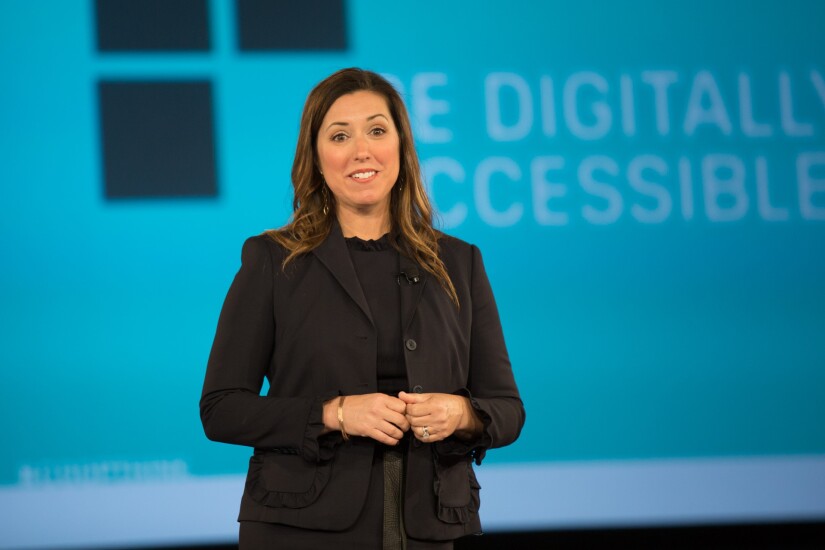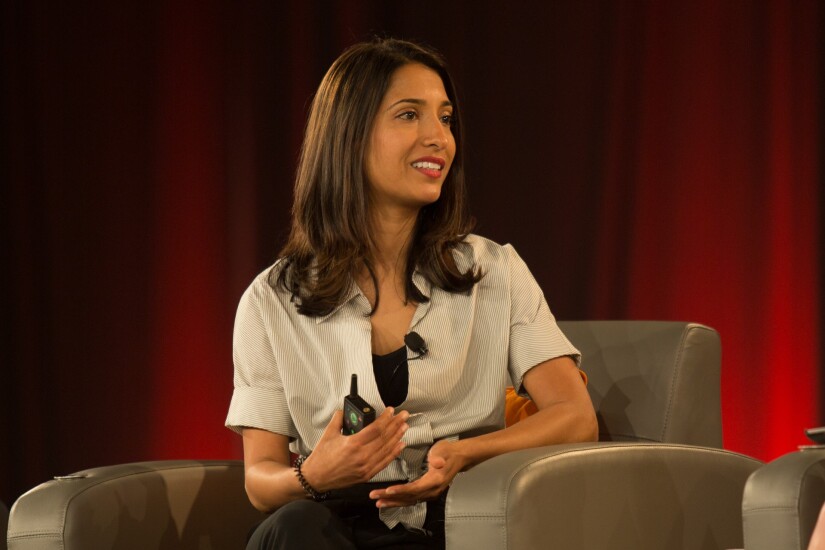
THINK about it

How AI will impact the future
That was the message from Nicholas Thompson, editor-in-chief of Wired magazine, who shared a cautionary tale of how Mexican restaurants were receiving dramatically lower ratings than other eateries in their areas. Turns out, the artificial intelligence behind the website had been programmed to recognize the word “Mexican” frequently was used in a negative context, and therefore the AI concluded a Mexican restaurant was bad in some way.
“Do we trust machines to make decisions? The data that powers AI systems can have biases,” Thompson said Tuesday. “Most of the world is focused on artificial intelligence. We need to have a national conversation in the United States about the use of data, but we are not doing it.”
According to Thompson, technology is reshaping society “in every way.” He noted people who are infertile soon may soon able to have babies by creating their own stem cells from any adult cell. Similarly, if a person has died but left DNA on a hairbrush, someone still might produce a child with the deceased.
“This is coming, and we will have debates,” he said. “One couple met on virtual reality, fell in love and got married. Wired covered the wedding, which had guests attending in virtual reality. Science doubles every 18 months, same as computing capacity.”
Thompson warned data privacy is a topic that had received far too little scrutiny. He said there was “15 years of under-reaction to lack of privacy, followed by a month of overreaction” following the Cambridge Analytica/Facebook scandal connected to the 2016 presidential election.
Algorithms are changing the way humans communicate, Thompson continued. He said the 2016 election showed how Facebook created algorithms to deliver news based on anger. More recently, Instagram created algorithms to remove mean comments and/or emojis. The AI was programmed to identify comments that were mean, racist or sexist. In the same vein, Google is building programs to identify terrorist content.
“Think about the implications for free speech,” Thompson said. “This is a country founded on the philosophy of free speech. But instead of the Supreme Court deciding the limits of speech, it is Instagram.”
What about jobs in the future given the transformation of AI? Thompson noted robots and computers are surpassing humans in many ways, and the number of tasks they succeed at is increasing. “It will get to the point where machines will be better than everything,” he said. “But it will not all be bad. ATMs were supposed to mean the end of tellers when they were introduced in the 1970s, but they improved banking. There are more tellers today than there were in the 1970s, and because they are not dispensing cash they have more interesting tasks to do. We have worried about machines taking jobs from humans for hundreds of years.”
According to Thompson, there are choices people need to make now that will have huge consequences later. “AI will do incredible things, but we need to make moral and sophisticated choices. There is never a moment you catch up with technology, it is always changing.”

Leadership lessons from an Olympian
Asked how he achieved such excellence, he said every person defines the term in his or her own way.
“When I started this whole journey it was with the goal of breaking world records and winning gold medals. That is what I wanted as a little kid,” he recalled. “When I got there, I had to redefine my goals. Goals really drove me and made me as good as I possibly could.”
Phelps’ older sisters swam competitively and had the opportunity to travel, which piqued his interest at a young age. At 11, his swim coach told the family Phelps could be an Olympian in four years – if he dropped baseball, lacrosse and the other sports he was playing.
“My coach trusted me and believed in me,” Phelps said. “My parents divorced at a very young age and I needed a father figure. We did it together. At 11 I did not fully understand how hard it was going to be, but at 15 I made my first Olympic team.”
One constant of the next 16 years was the setting of “massive goals,” Phelps continued. He noted there were bad days, times he did not want to swim, but he found motivations and stuck with the workouts that made him a great swimmer.
From 2001 to 2006, Phelps was in the pool 365 days a year – even on his birthday or if he was sick – because he wanted to be successful.
“I was a professional athlete at 15. I wanted to change the sport of swimming. To do so, I had to do things differently than anyone had ever done before. In swimming, if you take a day off it takes two days to get back to where you were.”
Visualization was a part of Phelps’ training. Early on, his coach wrote “WR” on a piece of paper: two initials that stood for world record.
“My coach told me I would break a world record in six months. I did it. Every time I broke a world record I got to buy something. Visualizing mentally prepares you for success.”
Phelps was asked about being an “underdog,” because credit unions are the underdogs in the financial world. He said his sixth grade teacher told him he would never amount to anything, and during his childhood he was picked on and made fun of because he had big ears and shaved his legs.
“Doubters have always fueled me,” he declared. “There is nothing more rewarding than jamming their words down their throats. If someone doubts me, I let them talk, but then I show them. I let my actions do the talking. There shouldn’t be a damn thing in this world that stands between you and what you want to accomplish, but you have to do the work.”

What it takes to beat CUs' biggest competitor
Paxson, chief marketing and experience officer for Rancho Cucamonga, Calif.-based CO-OP Financial Services, noted 2018 marks the 11th THINK Conference.
“We believe once a year credit union leaders should press the pause button to look at what is happening on the road ahead,” she said. “We need to take emerging technology and apply it to our business to make credit unions the choice provider for financial services. At a time of rapid change, why not us? Why can’t we be the ones to harness the power of digital transformation to power credit unions forward? THINK was founded to find that inspiration.”
Paxson said credit union members “don’t and won’t wait” for CUs to be excellent. She noted Jeff Bezos, CEO of online retailer Amazon, says, “Yesterday’s ‘WOW’ quickly becomes today’s ‘ordinary.’”
“Our biggest competitor is member expectations,” Paxson said. “We have to consistently exceed member expectations every day. Excellence does not live in a single moment, but it is moment by moment, every day. In the credit union evolution/revolution, we do not have to wait to bring innovative technology. We can advance credit unions through artificial intelligence by applying technology while keeping our human touch.”
Studies have found people define successful customer service by a friendly welcome, not up-to-date technology, Paxson continued. Further: one-third of customers indicate they will walk away from a brand they love after just one bad experience.
“We can use data to optimize engagement, but then we need to anticipate the needs of members and deliver things they might not even realize they want,” she counseled. “We have to be digitally accessible. We have to reach into channels we do not fully control. AI can uncover insights that help us drive innovation, but it still needs to be member centric. AI can change the game for fraud detection, so credit unions can focus on the human touch.”
Integration is a “key concept,” Paxson said, adding CUs need to integrate channel experiences. She said all the pieces must work together in an integrated way.
“Integrated channels means the website knows what the member did via their phone. Members choose the channel that is easiest and most convenient for them at that time, but there needs to be consistency across all channels. This might be the most important strategy to improve the member experience right now. Integrate to innovate. Open banking is an ecosystem. We share with each other – which is a very credit union philosophy.”

Expanding financial access around the world
“It is not enough for us to do credit scoring, our vision is putting customers in the center of it all,” she said at CO-OP’s THINK Conference Tuesday. “We want them to be in control. It is designed from the person up. It realizes people need $100 to $200 for three to four weeks, or we can go up to $1,000. We change a fee ranging from 10 percent to 15 percent. I think of our product as a digital credit card.”
Tala first launched in Kenya. It is a small country with just 44 million people, but 70 percent of the population regularly uses mobile wallets, Siroya explained. Many Kenyans are on Facebook and Twitter, so the company used those platforms to market itself. It received 1,000 sign-ups in the first week.
“People told us they were happy to be trusted by a company they had never met in person,” Siroya said.
Despite the fact Tala lending is completely unsecured, its repayment rate is 92 percent, with 6.7 million loans made to date.
Siroya said the first priority is controlling for fraud. This starts with making sure the person doing the application actually is that person and the device is actually theirs. Second is capacity: how much money should be offered to the person? Third is assessing the likelihood of repayment.
“The third is the biggest piece,” she said with a laugh. “We feel we should be able to lend to 95 percent of the population.”
Tala uses alternative data to create its scoring system. For the first 10,000 loans, Siroya said the company was lending “blind” as it developed the algorithm.
There will be an opportunity for CUs to work with Tala when it comes to the U.S. Siroya said the company can provide its experience and best practices.
“Our visions and value systems are aligned,” she said of Tala and credit unions. “It is not about credit, it is about the customer. We can talk about the factors in our model that allow us to score people.”

How CUs can stop siloing their most important member data
According to Jain, only 11 percent of credit unions use data to make informed decisions.
“Traditional organizations get lost in pursuit of bulletproof solutions,” he said. “Less than one-third of businesses are good at translating data into measurable business outcomes.”
Jain warned of the dangers of silos within a credit union’s organization. He said when functions become siloed, members get fragmented experiences.
“Organize the credit union to bring those silos together,” he advised. “Think big, start small and move fast. Start with one function.”





